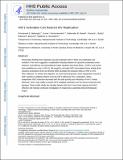HSF1 Activation Can Restrict HIV Replication
Author(s)
Nekongo, Emmanuel E; Ponomarenko, Anna I; Dewal, Mahender B; Butty, Vincent L; Browne, Edward P; Shoulders, Matthew D; ... Show more Show less
DownloadAccepted version (1.738Mb)
Open Access Policy
Open Access Policy
Creative Commons Attribution-Noncommercial-Share Alike
Terms of use
Metadata
Show full item recordAbstract
Copyright © 2020 American Chemical Society. Host protein folding stress responses can play important roles in RNA virus replication and evolution. Prior work suggested a complicated interplay between the cytosolic proteostasis stress response, controlled by the transcriptional master regulator heat shock factor 1 (HSF1), and human immunodeficiency virus-1 (HIV-1). We sought to uncouple HSF1 transcription factor activity from cytotoxic proteostasis stress and thereby better elucidate the proposed role(s) of HSF1 in the HIV-1 lifecycle. To achieve this objective, we used chemical genetic, stress-independent control of HSF1 activity to establish whether and how HSF1 influences HIV-1 replication. Stress-independent HSF1 induction decreased both the total quantity and infectivity of HIV-1 virions. Moreover, HIV-1 was unable to escape HSF1-mediated restriction over the course of several serial passages. These results clarify the interplay between the host's heat shock response and HIV-1 infection and motivate continued investigation of chaperones as potential antiviral therapeutic targets.
Date issued
2020Department
Massachusetts Institute of Technology. Department of ChemistryJournal
ACS Infectious Diseases
Publisher
American Chemical Society (ACS)